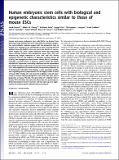Human embryonic stem cells with biological and epigenetic to those of mouse ESCs
Author(s)
Jaenisch, Rudolf; Hanna, Jacob; Cheng, Albert W.; Saha, Krishanu; Kim, Jongpil; Lengner, Christopher J.; Soldner, Frank; Cassady, John P.; Muffat, Julien; Carey, Bryce W.; ... Show more Show less
DownloadHanna-2010-Human embryonic stem.pdf (1008.Kb)
PUBLISHER_POLICY
Publisher Policy
Article is made available in accordance with the publisher's policy and may be subject to US copyright law. Please refer to the publisher's site for terms of use.
Terms of use
Metadata
Show full item recordAbstract
Human and mouse embryonic stem cells (ESCs) are derived from blastocyst-stage embryos but have very different biological properties, and molecular analyses suggest that the pluripotent state of human ESCs isolated so far corresponds to that of mouse-derived epiblast stem cells (EpiSCs). Here we rewire the identity of conventional human ESCs into a more immature state that extensively shares defining features with pluripotent mouse ESCs. This was achieved by ectopic induction of Oct4, Klf4, and Klf2 factors combined with LIF and inhibitors of glycogen synthase kinase 3β (GSK3β) and mitogen-activated protein kinase (ERK1/2) pathway. Forskolin, a protein kinase A pathway agonist which can induce Klf4 and Klf2 expression, transiently substitutes for the requirement for ectopic transgene expression. In contrast to conventional human ESCs, these epigenetically converted cells have growth properties, an X-chromosome activation state (XaXa), a gene expression profile, and a signaling pathway dependence that are highly similar to those of mouse ESCs. Finally, the same growth conditions allow the derivation of human induced pluripotent stem (iPS) cells with similar properties as mouse iPS cells. The generation of validated “naïve” human ESCs will allow the molecular dissection of a previously undefined pluripotent state in humans and may open up new opportunities for patient-specific, disease-relevant research.
Date issued
2010-05Department
Massachusetts Institute of Technology. Computational and Systems Biology Program; Massachusetts Institute of Technology. Department of Biology; Whitehead Institute for Biomedical ResearchJournal
Proceedings of the National Academy of Sciences of the United States of America
Publisher
National Academy of Sciences
Citation
Hanna, Jacob, et al. "Human embryonic stem cells with biological and epigenetic to those of mouse ESCs." PNAS May 18, 2010 vol. 107 no. 20 9222-9227.©2010 by the National Academy of Sciences.
Version: Final published version
ISSN
0027-8424
1091-6490